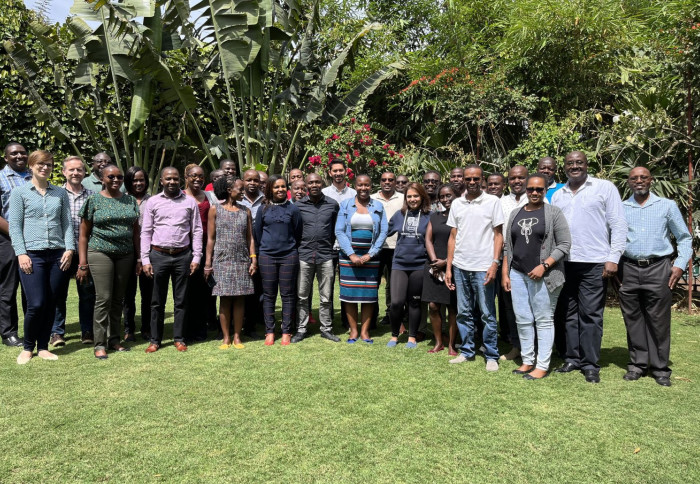UK-Kenya cooperation is blueprint for Africa's clean energy future
by Greg Brina

Experts call for increased investment to develop local expertise if Africa is to prioritise clean energy technologies ahead of fossil fuels.
Academics are calling on politicians, funders and research institutes to increase support for local institutions in building local expertise to empower African countries to plan a clean energy future. Reflecting on a flourishing collaboration with the Kenyan Ministry of Energy, the Climate Compatible Growth (CCG) programme – funded by UK Aid at the Foreign, Commonwealth and Development Office – says there is no ‘one-size-fits-all’ solution, so investment and co-creation of insights with local specialists will be key.
Climate change caused by greenhouse gas emissions is leading to increased droughts and storms across the world, hitting low-income countries hardest. The diversity of energy needs across Africa present a challenge for meeting both development goals and climate targets. Solutions will need to meet conflicting objectives to drive economic growth whilst providing climate-conscious low-carbon energy services to all.
CCG Director Professor Mark Howells, of Imperial College London’s Centre for Environmental Policy, said: “Over the past 15 months, our team have been working in Kenya with local stakeholders to develop training programmes for energy system modelling. These are mathematical computer simulation tools that can show how energy systems would operate across a mix of options, providing insights on investment, technology, and infrastructure needs. They enable a focus on designing sustainable energy systems that meet the future needs of a developing region or country.”
The CCG programme brings together leading research organisations from across the UK and partners them with local institutions, government, banks, and other stakeholders to identify low-carbon solutions. These collaborations assess policy, regulatory, and business models, that are fit-for-purpose, in collaboration with local researchers and policy makers.
In October, CCG experts provided two training workshops on energy system modelling in Nakuru, Kenya. More than 40 participants from across the Kenyan energy sector attended this training on FlexTool and OSeMOSYS, two open-source energy systems models.
The input from local specialists is key to incorporate Kenya’s development plans and energy security priorities into the scenarios and model assumptions. Dr Pooya Hoseinpoori SGI Research Associate
Dr Pooya Hoseinpoori of Sustainable Gas Institute who led the FlexTool training workshop said “At CCG our aim is to co-develop these models and data sets with local experts during these workshops. In our workshops, we collectively explore different aspects of modelling methodology and discuss how to tailor the models to better represent Kenya’s energy system. The input from local specialists is key to incorporate Kenya’s development plans and energy security priorities into the scenarios and model assumptions. This co-development approach, I believe, makes these workshops an invaluable learning experience for everyone.”
Mungai Kihara from the Kenyan Ministry of Energy said: “The collaboration between Ministry of Energy and CCG has assisted us to build the capacity on energy planning modelling. It started with a focus on the power system using OSeMOSYS and FlexTool which are open sources tools thus making the process sustainable. We have now started working on the whole energy system, something that we have never done before but it is now a requirement as per energy law. Working together with the experts both from UK and Kenya, we were able to explore different scenarios in the Kenya energy system and how the system may evolve in future.”
A landmark paper led by CCG and published in Nature Energy in October, brought together contributions from over 50 academics, most of them from African Institutions. This highlighted the vast difference in energy needs between countries across the continent, and the importance of country-specific planning.
In Kenya we have worked to co-create tools which can provide insight to support decision-making on energy futures. Prof. Adam Hawkes Director, SGI
Professor Adam Hawkes, Director of the Sustainable Gas Institute at Imperial, a co-author of the article and whose team of researchers delivered the training in Kenya said: “This article underscores that it is African thinkers who will forge Africa’s low emissions future. Global policymakers are challenged to take into account diverse local contexts and engage with regional experts. In Kenya we have worked to co-create tools which can provide insight to support decision-making on energy futures. Together we will continue to embed an ecosystem of expertise and training resources to ensure lasting impact.”
Steve Pye, Associate Professor in Energy Systems at University College London, who leads the CCG’s collaborative work on energy planning across the global south and whose team led the whole energy system model development for Kenya said: “The Energy Systems Modelling Programme in Kenya is the CCG’s first. The success we have had, in a short space of time, bodes well for expanding our efforts and engaging with other countries. Similar FCDO projects are underway in Zambia, and more widely across the global south in Laos DPR and Vietnam. Well-trained local expertise will be one of the most effective ways to ensure decarbonised energy systems become the new normal.”
Article text (excluding photos or graphics) © Imperial College London.
Photos and graphics subject to third party copyright used with permission or © Imperial College London.
Reporter
Greg Brina
Business School